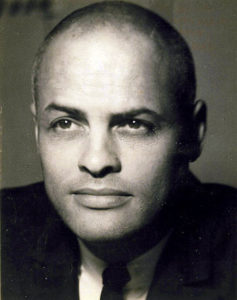
George Olden
*George Olden was born on this date in 1920. He was a Black graphic designer.
George Elliott Olden was born in Birmingham, Alabama, the grandson of a slave and the son of a Baptist preacher. In his youth, he attended Dunbar High School in Washington, D.C., then Virginia State College, before dropping out shortly after the attack on Pearl Harbor to work as a graphic designer for the Office of Strategic Services (OSS), the forerunner of the CIA. During his time at the OSS, Olden worked for some of America's leading artists, designers, and writers and made contacts that opened significant professional opportunities after the war.
When the war ended in 1945, the head of the OSS communications division, Colonel Lawrence W. Lowman, who in civilian life became Vice President of CBS's television division, was searching for someone who "had a full grasp of the whole range of commercial-art techniques." He found Olden, and from a one-man operation involved with six programs a week, Olden eventually headed a staff of 14 in charge of 60 weekly shows. When he joined the network in 1945, there were 16,000 television sets nationwide. By the time he left the network in 1960, there were 85 million sets, one for every two Americans. From 1945 to 1960, Olden worked with William Golden, art director for CBS, and was one of the first Blacks to work in television.
At CBS, he was an ardent champion of contemporary art, commissioning on-air art and title cards by modern artists. “The door is open for artists on TV,” he proclaimed in 1954. One example was the creation of the "To Tell the Truth man" icon used during that show's 1956-1978 seasons. He was a member of the Institute of Graphic Arts (AIGA). In 1960, he began to work in advertising and went on to design the Clio Award and receive seven of them. In 1960, he moved to BBDO as the TV group art supervisor. In 1963, he became the VP-senior art director at the major firm McCann Erickson. In 1963, he was the first Black to design a postage stamp for the United States Postal Service.
The design commemorated the centennial of the Declaration of the Emancipation Proclamation with a simple design of a broken chain in black on a blue background. He attended a White House ceremony where President John F. Kennedy introduced the stamp. In 1970, McCann Erickson laid him off because of the economic downturn of the time. Olden had a mixed legacy in terms of race. Despite his position at McCann Erickson, he tended to avoid pressing racial issues or pressing firms to hire Blacks, saying acceptance into the industry is a matter of talent.
His stance on race often earned him the description of being arrogant and standoffish. However, in 1970, he sued his former employer, McCann Erickson, for wrongful termination caused by discrimination. He cited the dissolution of the Professional Advisory Council (PAC), of which he was a member, as a conscious decision not to allow him to move up in the company, thereby keeping him at the level at which he joined the company.
McCann argued that Olden never requested a transfer out of PAC into a position that would lead to greater promotion within the company. In 1972, the Equal Employment Opportunity Commission found reasonable cause that the company practiced discriminatory hiring but did not find the reasonable cause on behalf of Olden. After moving to Los Angeles, California, Olden started a class-action lawsuit against McCann Erickson for discrimination but was shot to death, allegedly by a live-in girlfriend.
The latter was arrested and tried a few days before the class-action lawsuit began. She pleaded not guilty and was acquitted in court. He was an Institute of Graphic Arts (AIGA) medal-winner who worked in television and advertising. A Japanese magazine, Idea, once listed him among the top fifteen designers in the United States. George Olden died on February 25, 1975. He was the father of author Marc Olden and child actor/model Georg Olden, Jr.